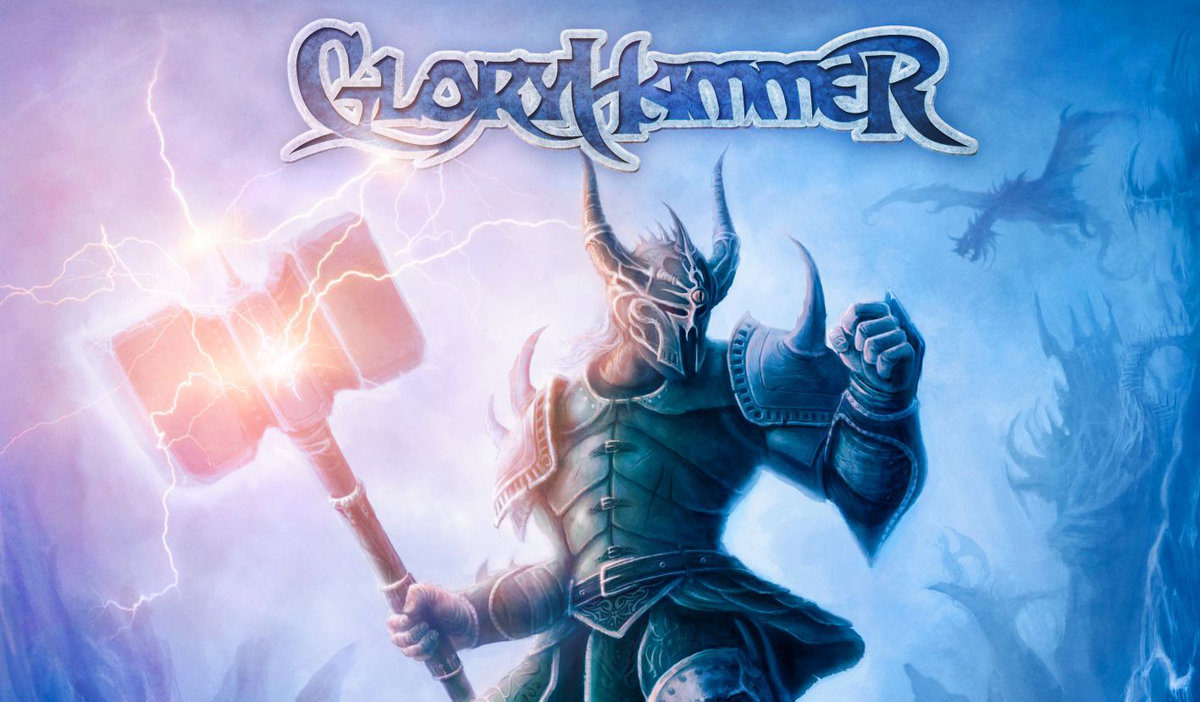Yes, I understand that this record came out in Spring of 2013. With that said, look at the calendar. The end of the year is approaching and we need to make sure we hit on everything people have been remotely talking about. Well, not everything. That would be impossible.
One of the more talked about power metal records has been from a Scottish/Swiss based project called Gloryhammer. Gloryhammer is fronted by Christopher Bowes, the vocalist and keyboard player from the “pirate metal” act Alestorm. Alright, I can see where this is going. Containing a mixture of humor and heavy metal, Gloryhammer quests through the very self aware realms of epic metal, crafting one of the most predictable and stereotypical power metal records ever made. This is of course all intentional.
I feel that intention is a very important aspect of evaluating Gloryhammer. As noted in many interviews, the band is a tongue-in-cheek play on traditional power metal structure with lyrics that border on the lands of parody. This is important to realize up front because attempting to evaluate this band and their debut album, Tales from the Kingdom of Fife, would be difficult if approaching it with any sort of seriousness or without all information revealed. There is a strong indication that this band is fucking with you.
Gloryhammer’s music is a top down clone of traditional power metal specifically bands like Rhapsody of Fire. Everything is present, including the strong double kick, choral anthems, swirling synth, and prominent guitar that has a penchant for neoclassical solos. From the band’s opening track, “The Unicorn Invasion of Dundee,” the band nails emulation and proceeds to showboat through the entire record. Gloryhammer’s talent at not only recreating the power metal archetype but also adding multiple layers of self reflective humor, making them beyond impressive. The cover art is perhaps even the best work done by Dan Goldsworthy and causes a moments pause on where this lies in terms of crafted humor. I just wish that the band and everyone involved used their talents to a more positive end.
As I said before, intention is important. I felt that knowing that Gloryhammer was just going to rip on popular power metal made this record more enjoyable. Tales from the Kingdom of Fife is certainly enjoyable for its slight humor angle, but there still exists a nagging feeling that talents could have been put to better use. While the stereotypical lyrics certainly add to the whole atmosphere of epic power metal, their generic nature distracts from the very real talent of its members. The absurd high fantasy lyrics and intentional satire sometimes weighs the whole production down, leading to a very well crafted joke that somehow demands less attention.
Let us stay on the lyrics for a moment longer. It is interesting how Gloryhammer can pull from pretty much the same vocabulary as bands like Rhapsody and early Avantasia but manage to make them sound more condescending and less convincing. Taking a look at Gloryhammer’s “Magic Dragon”:
“Demon attacked me but then it was slain
the dragon appeared and a battle was fight
I spoke from the words of a powerful scroll
and magical dragon became now allied.”
compared it to Rhapsody’s “Power of the Dragonflame”:
“Ruins of ancient wisdom closing now my darkest lonely eye
god is dead in Thorald and in Elnor’s rhyme
Mutilated bodies are now carved in ancient holy stone
tragic decoration of unholy wars”
may seem to suggest they are cut from the same power metal cloth but there is a distinct difference for anyone with a rudimentary knowledge of fantasy. Gloryhammer is satisfied at mimicry rather than craft. Their lyrics run like an epic style of power metal Mad Libs where the word basnd is just everything pulled from 20 years of similar records. As with bands like Dethklok and Spinal Tap, there exists little need to make good lyrics rather than just recreate ones that already exist.
When writing this review I want to make mention how I can take a joke. I found the idea and execution of Tales from the Kingdom of Fife to be entertaining. With that said, the longevity of the record is the problem, as Gloryhammer’s existence depends on the listener understanding a well made satire. While this combination of humor and parody certainly has an audience, the fact that the only people to get the humor are ones already familiar with power metal or people who never want to take it seriously in the first place. This leads to further complications as the listener might have to make the decision to listen to a parody or a serious attempt at the genre. Of course some people can have both but others might not be as willing. Tales from the Kingdom of Fife was entertaining to experience, at times perhaps even more than the bands being parodied, but in the grand scale of power metal it will never have the strength to weather critical importance.
Tags: Gloryhammer, Hollywood Metal, Kaptain Carbon, Tales from the Kingdom of FifeCategorised in: Metal

